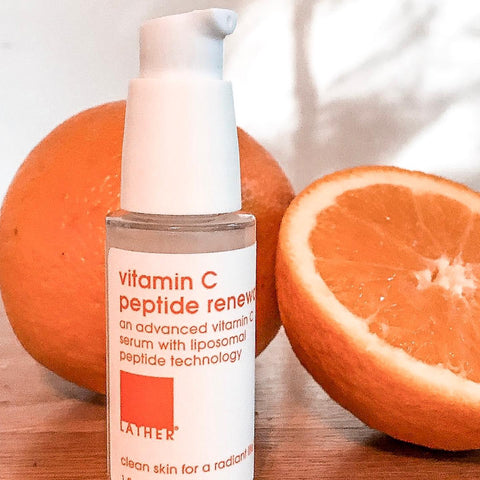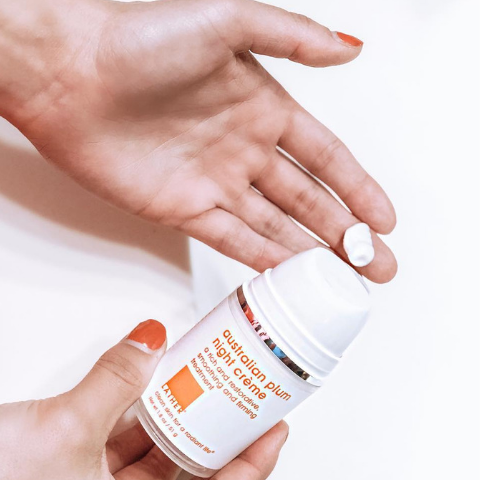Vitamin C 101: Everything You Need to Know About This Skincare Ingredient
Posted by Team LATHER on


Vitamin C is everywhere on skincare shelves—and for good reason! A dermatologist and esthetician favorite, it is renowned for its brightening abilities that delivers a beautiful, radiant glow. On top of that, vitamin C is known to be essential for collagen synthesis and works as an antioxidant to fight free radical damage. Thanks to these factors, it’s considered a potent ally to the science of gracefully aging.
Vitamin C is present in several of our products that you can incorporate into your skincare routine, whether you have used vitamin C products before or are introducing it into your routine for the first time. In this piece, we’ll explore vitamin C in-depth and explain how it works in our products to give you the best skin of your life.
Vitamin C’s Role in Brightening
As you age, you may develop hyperpigmentation on your face, neck, and chest from accumulated sun exposure and other environmental factors. If you want to fade the discoloration, consider skincare products containing vitamin C, as it’s best known to brighten and even out skin tone.

The appearance of hyperpigmentation can be reduced with regular use of a product that contains vitamin C (like our Vitamin C Peptide Renewal) because vitamin C inhibits tyrosinase. Tyrosinase is an enzyme that catalyzes the production of melanin, which is what gives our skin, hair, and eyes it's color. Melanin is increased in the skin through sun exposure, which is how our skin tans. Melanin is produced in the skin basically as a form of protection against UV rays. By inhibiting tyrosinase, vitamin C prevents this increase of melanin and gradually fades away dark spots that have too much melanin.
Over time, with vitamin C use, you can even out your skin tone, making it more luminous.
Vitamin C’s Role in Collagen Synthesis
Collagen is a structural protein that occurs abundantly in the body. It makes up about 25% to 35% of the protein content in the body. It can be found in tendons, ligaments, muscles and, of course, skin. In the skin, it is responsible for keeping it firm and supple,
but unfortunately, it gradually degrades past the age of 30. This is why we develop fine lines, wrinkles, and sagging skin. It’s nice to think that if collagen didn’t gradually degrade, we wouldn’t have wrinkles and sagging. But sadly that’s not the case. Enter vitamin C, which helps with collagen synthesis.2 This fact has been proven in various studies as well, which have found that it works for both young and aged skin. Moreover, both applying vitamin C topically and ingesting it can have positive effects on the skin, ultimately helping to stimulate collagen.
Vitamin C’s Role as an Antioxidant
Antioxidants are essential compounds that inhibit oxidation. Oxidation produces free radicals, which are unstable atoms that can damage cells throughout the body. By damaging skin cells, they can also accelerate aging. Antioxidants can help prevent this damage, thereby also preventing common signs of aging. They can slow down the degradation of collagen, which is essential in keeping skin healthy, youthful and firm.
Vitamin C has potent antioxidant abilities. It can help prevent oxidation and thus reduce and prevent free radical damage, which is largely responsible for affecting skin cells and causing damage that can promote signs of aging like wrinkles and sagging. Antioxidants can be found in various foods like most vegetables and fruits, including oranges, lemons, spinach, plums, raisins, blueberries, and blackberries. A diet rich in antioxidants can help prevent free radical damage, but applying vitamin C topically via various serums and creams can have the same effect.
Vitamin C Benefits for the Body
Ingesting vitamin C via food has a lot of benefits for the body. It is involved in a variety of crucial bodily functions, including the formation of collagen, wound healing, strengthening of the immune system, iron absorption, and maintenance of cartilage and bones. Vitamin C is an essential vitamin, which means it cannot be produced by the body but must be supplied from outside sources. A delicious and healthy vitamin C-rich drink you can consider this summer includes combining mango, papaya, pineapple and strawberries in a blender for a great smoothie to quench your thirst and give you a very high dose of the vitamin. These fruits are among the richest sources of vitamin C there are.
Want to Try Vitamin C on Your Skin? Try These Two LATHER Skincare Elixirs!
Vitamin C Peptide Renewal - This is a lightweight but potent serum that contains grape extract, high in vitamin C, plus a uniquely stable form of vitamin C. One problem with vitamin C is that it is rather unstable, especially when exposed to light and heat. This exposure causes it to degrade and lose its potency. The version of vitamin C in our serum is 5% ascorbyl glucoside made with natural vitamin C (ascorbic acid) that has been stabilized with glucose so it is less susceptible to oxidation. It also contains sodium hyaluronate, niacin, and phospholipids to help protect, nourish, hydrate and refine skin texture.

Australian Plum Night Crème - The Australian Kakadu Plum, the main ingredient in this night cream, contains up to 100 times more vitamin C than an orange. This formula helps protect skin from oxidative stress (an imbalance of free radicals and antioxidants in the body which can lead to problems). While you sleep, it will help address issues of skin aging like fine lines and wrinkles, essentially plumping them up. Over time, of course, wrinkles and fine lines will be less noticeable as vitamin C helps to increase collagen in addition to brightening and fighting free radical damage to prevent further formation of wrinkles.
